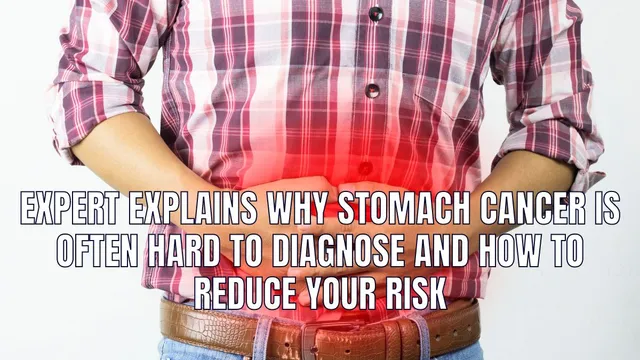- By Priyanka Munshi
- Fri, 21 Jun 2024 04:24 PM (IST)
- Source:JND
Stomach cancer, also known as gastric cancer, is a disease where malignant cells form in the lining of the stomach. It often develops slowly over many years and may go unnoticed in its early stages due to mild or vague symptoms like indigestion, stomach discomfort, or mild nausea. As the cancer progresses, more severe symptoms can appear, including persistent stomach pain, difficulty swallowing, weight loss, and vomiting.
Some of the risk factors for stomach cancer include a family history of the disease, chronic gastritis, smoking, and certain infections like Helicobacter pylori. Early detection is crucial for better treatment outcomes, typically involving a combination of surgery, chemotherapy, and radiation therapy. Preventative measures such as maintaining a healthy diet, avoiding smoking, and getting regular medical check-ups can help reduce the risk of developing stomach cancer.
In a conversation with Jagran English Dr. M. Manisegaran, a consultant surgical gastroenterologist in minimal access surgery, bariatric, metabolic, and robotic surgery at Yashoda Hospitals in Hyderabad, discussed why stomach cancer is often hard to diagnose and how to reduce your risk.
According to Dr. M. Manisegaran, stomach cancer is difficult to diagnose in its early stages because it often produces no symptoms. As cancer advances, the symptoms mimic those of normal gastrointestinal diseases. Due to this, gastric cancer goes undetected for years before symptoms become severe enough to warrant diagnostic testing. No wonder the stomach was termed the “captain of men of death." It is the 4th most common cancer and the 2nd leading cause of cancer-related death.
What Are The Signs And Symptoms Of Stomach Cancer
- A painful or burning sensation in the stomach
- Heartburn, indigestion (dyspepsia)
- Sense of fullness after a small meal
- Nausea and vomiting
- Loss of appetite
- Weight loss
- A palpable lump in the abdomen
- Unexplained tiredness and weakness
- Blood in the vomit
- Black stools
- Jaundice and bone pain (signs of dissemination)
These symptoms are common in ulcer disease and inflammation of the stomach, and patients are often mistakenly treated for these causes with antacids and PPIs. A high index of suspicion is required to diagnose stomach cancer. The mainstay of diagnosis is an ultrasound abdomen, which can detect stomach masses, lymph node enlargement, and liver spread. Ascites, bone pain, and supraclavicular (Virchow lymph node) pain suggest stage IV cancer. Screening endoscopy with dye-chromatoendoscopy is used in high-endemic regions like Japan to detect early gastric cancer.
Risk Reduction And Early Detection
Healthy Diet: Excessive salt, pickles, and diets deficient in fresh fruits and vegetables increase the risk of gastric cancer. Diets rich in vitamin C reduce the risk.
Helicobacter Pylori: Check for gastric ulcers and Helicobacter pylori infection through endoscopy and rapid urease testing, and treat these infections with an eradication regimen.
Also Read: Top 20 Funny And Happy Quotes To Activate Your Weekend Mode
Processed Meats: Processed and red meats increase the risk, while whole-grain bread reduces the risk.
Smoked, Salted, And Preserved Foods: These increase the risk of stomach cancer.
Smoking: Both active and passive smoking increase the incidence of stomach cancer.
Exercise: Reduces risk, while excess weight and obesity enhance it.
Genetic Testing: CDH-1 gene and Lynch syndrome increase the risk of stomach cancer in families. Men are twice as likely to get stomach cancer as women.
Epstein-Barr Virus: May increase the risk of cancer in the stomach.
Previous Gastric Surgery And Bile Reflux Gastritis: Increase the risk.
B12 Deficiency With Pernicious Anemia And Atrophic Gastritis: Increase the risk.
Achlorhydria: Reduced or no HCL acid in the stomach increases the risk.
Tobacco And Alcohol: Any form of tobacco increases the risk, and alcohol likely increases the risk and accelerates progression.
Blood Group A: People with blood group A are more susceptible to stomach cancer.
Adenomatous Stomach Polyps: Increase the risk of stomach cancer.
Finally, Dr. M. Manisegaran emphasized that a healthy lifestyle and diet reduce the risk of stomach cancer. Endoscopy is the mainstay for diagnosing stomach cancer, and minimally invasive surgery is the primary treatment for operable stomach cancer.

